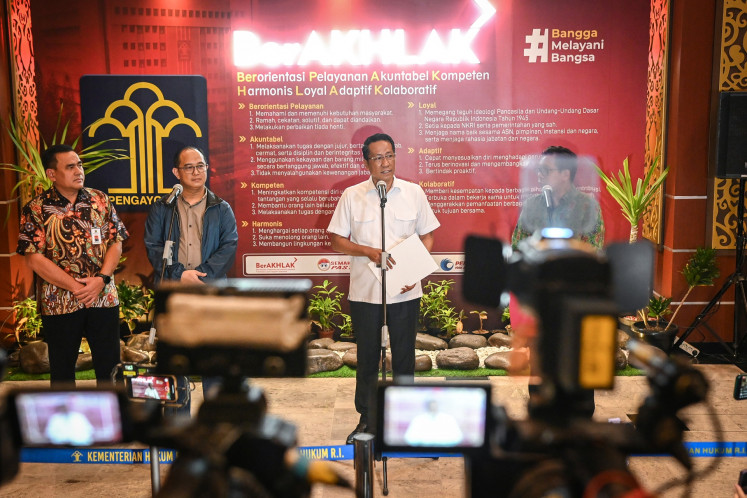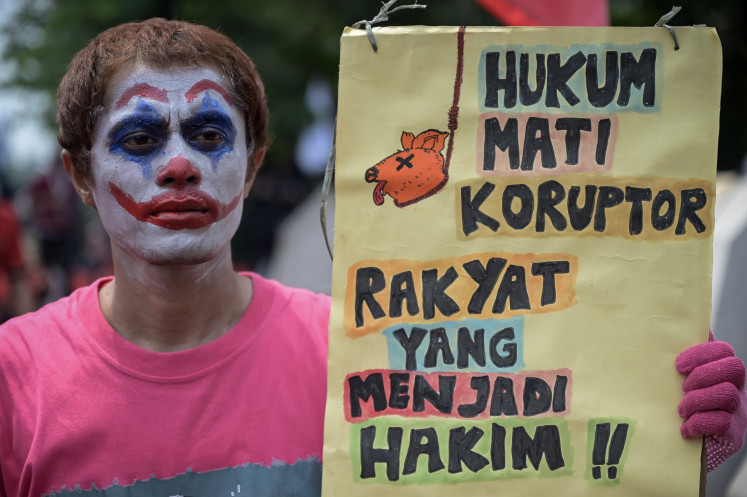Popular Reads
Top Results
Can't find what you're looking for?
View all search resultsPopular Reads
Top Results
Can't find what you're looking for?
View all search resultsSuicide bombing, lip service and the public discourse
As sympathies and blame are expressed after the suicide bombing at the GBIS church in Surakarta, Central Java, on Sunday, we are convinced that the incident will not be the last
Change text size
Gift Premium Articles
to Anyone
A
s sympathies and blame are expressed after the suicide bombing at the GBIS church in Surakarta, Central Java, on Sunday, we are convinced that the incident will not be the last.
However bitter the experience might be, our minds should now be accustomed to knowing that both sanity and insanity can still be seen in front of us.
The bombing must be understood in its proper context, beyond accusations of cowardice and the lip-service response given by the President.
The people need real guarantees of security instead of promises. The value of the National Police’s Detachment 88 and other counterterrorism units are questionable, as they are running behind most of the bombings.
We cannot directly accuse or scapegoat any religious group, since that might prejudiced. Other cases — in Europe, for instance — have shown us that violent radicalism is ubiquitous. It is not simply Islamists versus the world. The existence of hard-liners or opportunist groups must be taken into account in three steps.
First, campaigns against terrorism have never been a massive thing culturally. Religious leaders appear on TV screens immediately after bombings, as do politicians and governmental functionaries. However, one week later, as the situation calms down, there is another topic under discussion in the news.
Our present culture is overwhelmed by image. Appearing before a gathering is more important than doing something great behind the scenes. Following words with action is not a part of the culture.
Meanwhile, there is no cultural traditional that can penetrate the zeitgeist, other than intellectuals who espouse anti-terrorist values.
Couldn’t we watch, for instance, a soap opera that makes an effort to depict a harmonious Indonesian system of values in the name of religious diversity? Is there an anti-terrorism curriculum at schools? Can an Indonesian play depicting religious-cultural tragedy be staged for the public with a guarantee that the playwright and actors not be imprisoned?
Second, political expediency has made real freedom a luxury in Indonesia. Conflicts are inevitable.
The central government, for example, which has made numerous concessions for political gain, has allowed some regencies and provinces to enact religious laws that contradict the Constitution, universal human rights and other adherents of Islam who follow different schools of thought.
We don’t even know which ministers are anti-radical or anti-terrorist. The Religious Affairs Minister, for example, has conveyed support for radicalism and the unfair treatment of non-Muslims or non-mainstream Muslims since he took office. Just do a Google search and see for yourself.
Expediency has created uncertainty, a fragile situation that gives terrorists exactly what they are actually looking for. Large numbers can be mobilized for protests or, more importantly, to secure support. Opportunist politicians can persuade listeners to vote for them without realizing the impact of their fiery rhetoric on society as a whole.
And there is a domino effect. A region dominated by a majority can be misled into creating a tyranny of majority after seeing the success of another region. The despondent minority will choose to remain calm or might resist in their own way.
Most obviously, political expediency has constructed or cemented a principle: Terrorist radicalism survives despite continued efforts to abolish it. Through careful planning, bombing perpetrators can avoid any detection of their activities.
Third, the rhetoric and policies of state officials, supported by pro-government pundits, have confused the public. Instead of making an official apology for being unable to assure public security, for instance, they continually search for scapegoats.
The public has been taught to remain silent and act as if there were nothing to worry about.
It is time for public officials to stop their old approaches to terrorism. They have to stop the violence soon or chaos will take place again and again.
For us, the common people let’s tell our children or spouse, if they are in front of a TV, that killing somebody or destroying something is never religious. Let’s tell our colleagues at a cafe or work that ruining a house is much easier than building it.
At least it’s better than the empty rhetoric voiced by political clowns in the months before the general election.
The writer is a researcher at the Paramadina Foundation, Jakarta.










